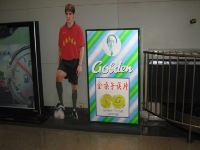
I grew up in the boom of New York's Long Island during the 1960s. I moved to the Houston boom of the 1970s, joined the PC boom of the 1980s, covered the Internet boom of the 1990s, and watched the housing bubble of this decade.
I know what booms look like.
Chengdu is a boom town. (To the right, an image of Brazilian soccer star Kaka hawking Chinese-made throat lozenges in Chengdu's Airport.)
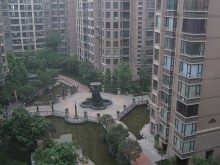
She is a very pleasant woman with superb English skills and, like many citizens of boom towns, has friends who can help when company comes. In this case there was a friend who could host us in a new, finished unsold apartment, another friend named Jack who is actually an American citizen from Irvine and showed us the town, and Tom, who said his mother and Jack's aunt were co-workers, with whom we spent most of our days with.
Everyone in a boom town is friendly. They believe the boom will continue. Booms never do. But as we Atlantans say, we can think about that tomorrow. Tomorrow is another day.
Imagine Atlanta layered on top of a Soviet-era street grid, filled with a young, teeming population of go-getters. This is Chengdu today. Our apartment is part of a smart new set of condos rising 13 stories high around a statuary-filled courtyard and given the improbable name of Victoria, The city is filled with billboards featuring young, attractive Chinese alongside European and American models and stars. LeBron James and soccer star Kaka (above) compete on equal terms for attention with Yao Ming.
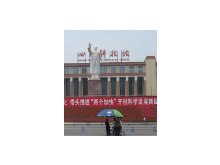
The local government has a solution to this congestion. Atlantans know it as MARTA. It's a single subway line being built underground through the heart of town. But the idea is new, the line is unbuilt, and the grand central station goes nowhere. People take their lunch there anyway, sitting on shaded benches while police look on. Police are the most seen and yet least-seen aspect of Chengdu. On a street corner I watch people go by smartly-dressed traffic police, each within inches of their face, but taking no notice of them.,
Young Chinese are proud to be part of the world. Their nationalism is based not on dominance but on membership, and the privileges of being equal to Europe, to America, Commercials feature young well-dressed Chinese with westernized looks and western clothes. They are like America a century ago, only played to the beat of the Eagles and the Carpenters.
Beneath all this hustle, bustle, and joy there is a growing generation gap. Older people wear conservative clothes, button-down shirts and slacks, while 20-somethings sport t-shirts with western slogans. Little kids are all small emperors or empresses, indulged and living in joy wherever they are found.
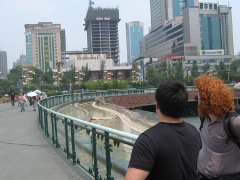
Chengdu is the first flat city east of the Himalayan foothills which rise to become the Tibetan plain. It's a bit like Denver in that, except for the added feature of a now well-known fault line that cracked open into a 7.9 quake on the afternoon of May 12, 2008. We were originally due to come here two weeks afterward. Our larger group canceled, Ms. Ning spent some extra time in the U.S., but while the disaster is not forgotten it has added yet-another layer to the boom, rebuilding added to the building.
Imagine if America had a half-dozen Mexicos inside it and you get a feel for what China faces. There is that young, growing and glowing middle class, working in office towers, driving to work, cosmopolitan in every sense, and then there are vast armies of people happy to find any work at any price. At lunch battalions of hard men come out of the construction sites to eat their meager lunches on the sidewalks, some not even removing their hard hats. Men man the machines that spit out tickets in the parking decks, they guard the gates at the entrances to developments like Victoria, in neatly-pressed outfits that look like police uniforms. Poor people lay out blankets and hawk jewelry on the sidewalks, while a few elderly just beg – much fewer than in any comparable American city. They are ignored, if anything, more avidly than their American counterparts.
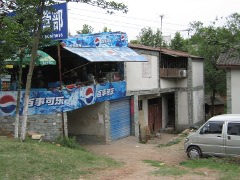
Reach the top of the ladder here and maybe you can try for a transfer to Shanghai, Hong Kong or Beijing, where the ladder reaches even higher, and falls much lower.
It's a scheme familiar to anyone with knowledge of America a century ago, the era of E.L. Doctorow's “Ragtime.” There's a giant statue of Mao Zedong in Chengdu's center, dressed in a Soviet-style greatcoat, reaching his arm out toward the future, but looking more like a giant traffic cop. He is as relevant to the city around him as the Confederate battle monument in the center of Decatur, Georgia, a mile from my house.
Communism? No one knows what that means anymore. Until things break down, as they did in the wake of the earthquake. Only then do people learn that communism is a source of cash and a giant self-perpetuating bureaucracy whose center no one can see, another ladder that can't be reached even if concerns are entirely local, even if you just want to know why your child died, why your little emperor or empress is gone, why their school fell but your home didn't. (If you're scoring at home, that's the Triangle Shirtwaist fire in “Ragtime”, and any protest the siege of the Morgan Library.)
It is at this point that an American patriot, like me, might be tempted to begin ranting about freedom and democracy, but after Katrina and Abu Ghraib, after Bush and Bernie Madoff, I don't feel qualified to do that any more. I don't think you're qualified either.
I suspect freedom and democracy are terms with meaning only for those whose bellies are full, and despite the Chengdu boom China's belly is still only half-full. As it fills demands for action rise around specific issues and, gradually, if the boom lasts long enough, maybe decision-making cracks open, reforms begin, transparency is attempted. If the party is big enough, if it's representative of the economy, if its mandarins rise on merit, that's things working out. That's what passes for hope here, when thoughts go beyond the daily yuan, known here as Renmimbi, the people's money. But thoughts seldom do go beyond money, most in Chengdu would rather live in money's bubble, in money's wake, than think about systems or leaders or anything they cannot control.
If that means that, as a Chinese citizen, I'd be voting for Hu Yintao, so be it. But so would you.
One more thing. Booms bust. Booms are not the test of a nation. Busts are. After the Chengdu boom busts, whenever that is, we will know a lot more. We will know what was wrong here, we will know what mistakes are being made right now, we will act as we did after the earthquake, and ask “how could this happen?”
Just like Americans.
That is a question for later. It's the question no one ever asks, at any time and anywhere. In any boom.










Hi! I was surfing and found your blog post… nice! I love your blog. Cheers!
Hi! I was surfing and found your blog post… nice! I love your blog. Cheers!